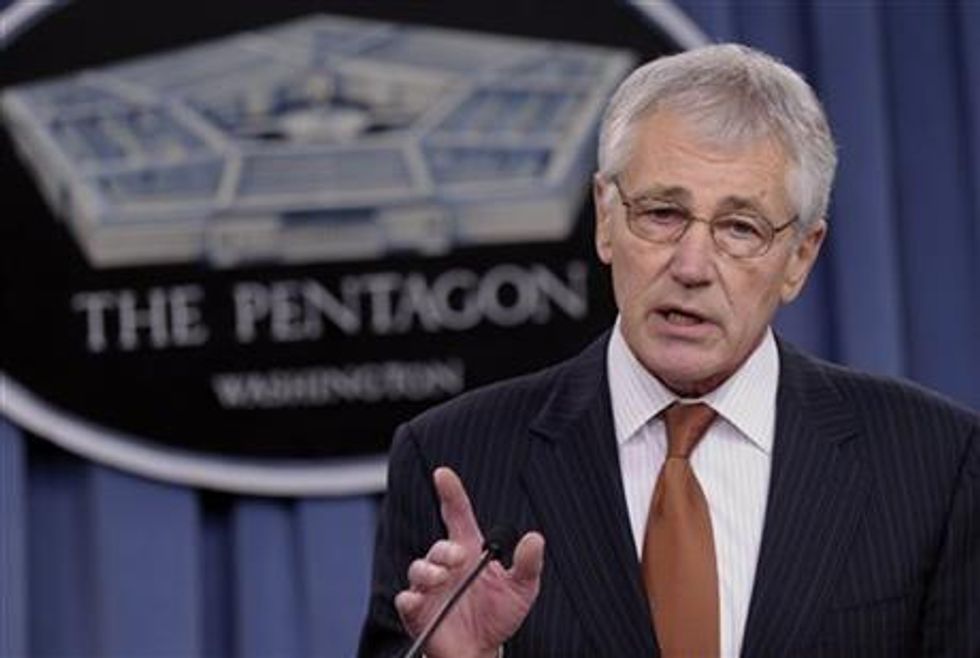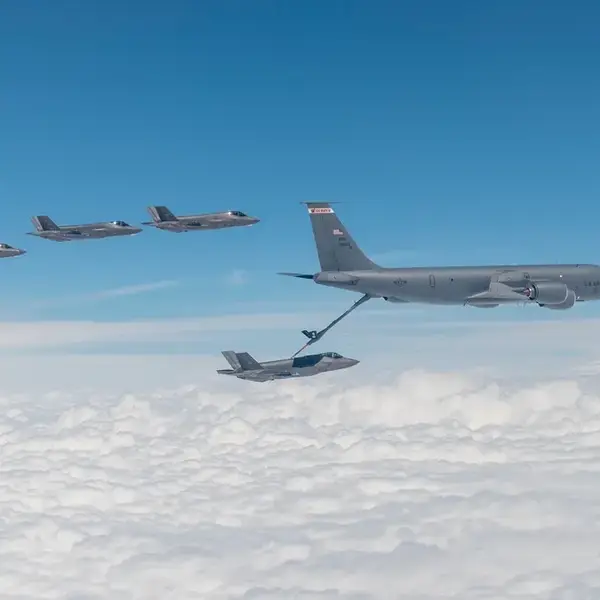New Pentagon Plan: A Few Less Troops, Same Old Empire
Progressive analysts note that proposed cuts to boots on the ground-style forces will not weaken US's global hegemony

"In essence what you are seeing is the financial part of the changing face of empire," said Tom Englehardt, noted foreign policy expert and editor of TomDispatch.com, in an interview with Common Dreams.
Hagel's address follows a leak of the budget announcement published in the New York Times over the weekend.
Phyllis Bennis, fellow at the Institute for Policy Studies, also told Common Dreams that the budget--on the one hand--reflects the "pragmatic recognition" that our military costs are unsustainable, particularly in the midst of huge economic downturn. And, "on the other hand, is a highly ideologically-driven decision rooted in transformation of the nature of war. Wars are not ending [but they] are being transformed from large-scale invasions and occupations--Iraq and Afghanistan--to much smaller scale Special Ops- dominated wars."
Following "two disastrous interventions which have been very, very costly," Englehardt added that the cuts reflect "the perfectly obvious and brain-dead thinking in Washington."
During the address, Hagel detailed the Department of Defense budget proposal for fiscal year 2015 and beyond. The budget calls for troop reductions in every department of the U.S. military, including civilian personnel. The number of active duty Army soldiers will be slashed 13 percent from its current 522,000 soldiers to between 440,000 and 450,000, which would make it the smallest since just before the U.S. entered World War II.
However, special operations forces, he noted, will increase by 6 percent totaling roughly 69,000 personnel.
"Conceptually, what's being cut is the idea of large number of troops on the eurasian landmass," said Englehardt. In place of the kind of wars in Iraq and Afghanistan, he added, we will be seeing more of a "different kind of intervention" with a "heavy emphasis on the 'secret military' or special operations."
"CIA, NSA--you dont see any of that stuff going," Englehardt added. "I think that global surveillance and intervention state you see being built is going to stay."
In addition to the troop cuts, the budget recommends the retirement of a number of aging and outdated military vehicles. However, according to Englehardt, what is most "striking" is the Pentagon's decision to maintain the fleet of 11 aircraft carriers.
"That is a massive investment," he added, saying that it is "obviously excessive" for the U.S. to maintain roughly five times more the number of aircraft carriers than any other nation. The real message, he says, is that the U.S. has made the strategic decision to cede control of the land and instead "control the sea and sky."
According to Bennis, "Any cut back to the military spending and size should be celebrated. But we should celebrate it in the context of reaffirming our commitment to continuing to struggle against all forms of war, whether large-scale ground ops or special forces."
"As practiced by the U.S. they are all illegal, immoral, and do not make us or people in countries safer," she concluded.
Sarah Lazare contributed to the reporting in this piece.
_____________________
An Urgent Message From Our Co-Founder
Dear Common Dreams reader, The U.S. is on a fast track to authoritarianism like nothing I've ever seen. Meanwhile, corporate news outlets are utterly capitulating to Trump, twisting their coverage to avoid drawing his ire while lining up to stuff cash in his pockets. That's why I believe that Common Dreams is doing the best and most consequential reporting that we've ever done. Our small but mighty team is a progressive reporting powerhouse, covering the news every day that the corporate media never will. Our mission has always been simple: To inform. To inspire. And to ignite change for the common good. Now here's the key piece that I want all our readers to understand: None of this would be possible without your financial support. That's not just some fundraising cliche. It's the absolute and literal truth. We don't accept corporate advertising and never will. We don't have a paywall because we don't think people should be blocked from critical news based on their ability to pay. Everything we do is funded by the donations of readers like you. Will you donate now to help power the nonprofit, independent reporting of Common Dreams? Thank you for being a vital member of our community. Together, we can keep independent journalism alive when it’s needed most. - Craig Brown, Co-founder |

"In essence what you are seeing is the financial part of the changing face of empire," said Tom Englehardt, noted foreign policy expert and editor of TomDispatch.com, in an interview with Common Dreams.
Hagel's address follows a leak of the budget announcement published in the New York Times over the weekend.
Phyllis Bennis, fellow at the Institute for Policy Studies, also told Common Dreams that the budget--on the one hand--reflects the "pragmatic recognition" that our military costs are unsustainable, particularly in the midst of huge economic downturn. And, "on the other hand, is a highly ideologically-driven decision rooted in transformation of the nature of war. Wars are not ending [but they] are being transformed from large-scale invasions and occupations--Iraq and Afghanistan--to much smaller scale Special Ops- dominated wars."
Following "two disastrous interventions which have been very, very costly," Englehardt added that the cuts reflect "the perfectly obvious and brain-dead thinking in Washington."
During the address, Hagel detailed the Department of Defense budget proposal for fiscal year 2015 and beyond. The budget calls for troop reductions in every department of the U.S. military, including civilian personnel. The number of active duty Army soldiers will be slashed 13 percent from its current 522,000 soldiers to between 440,000 and 450,000, which would make it the smallest since just before the U.S. entered World War II.
However, special operations forces, he noted, will increase by 6 percent totaling roughly 69,000 personnel.
"Conceptually, what's being cut is the idea of large number of troops on the eurasian landmass," said Englehardt. In place of the kind of wars in Iraq and Afghanistan, he added, we will be seeing more of a "different kind of intervention" with a "heavy emphasis on the 'secret military' or special operations."
"CIA, NSA--you dont see any of that stuff going," Englehardt added. "I think that global surveillance and intervention state you see being built is going to stay."
In addition to the troop cuts, the budget recommends the retirement of a number of aging and outdated military vehicles. However, according to Englehardt, what is most "striking" is the Pentagon's decision to maintain the fleet of 11 aircraft carriers.
"That is a massive investment," he added, saying that it is "obviously excessive" for the U.S. to maintain roughly five times more the number of aircraft carriers than any other nation. The real message, he says, is that the U.S. has made the strategic decision to cede control of the land and instead "control the sea and sky."
According to Bennis, "Any cut back to the military spending and size should be celebrated. But we should celebrate it in the context of reaffirming our commitment to continuing to struggle against all forms of war, whether large-scale ground ops or special forces."
"As practiced by the U.S. they are all illegal, immoral, and do not make us or people in countries safer," she concluded.
Sarah Lazare contributed to the reporting in this piece.
_____________________

"In essence what you are seeing is the financial part of the changing face of empire," said Tom Englehardt, noted foreign policy expert and editor of TomDispatch.com, in an interview with Common Dreams.
Hagel's address follows a leak of the budget announcement published in the New York Times over the weekend.
Phyllis Bennis, fellow at the Institute for Policy Studies, also told Common Dreams that the budget--on the one hand--reflects the "pragmatic recognition" that our military costs are unsustainable, particularly in the midst of huge economic downturn. And, "on the other hand, is a highly ideologically-driven decision rooted in transformation of the nature of war. Wars are not ending [but they] are being transformed from large-scale invasions and occupations--Iraq and Afghanistan--to much smaller scale Special Ops- dominated wars."
Following "two disastrous interventions which have been very, very costly," Englehardt added that the cuts reflect "the perfectly obvious and brain-dead thinking in Washington."
During the address, Hagel detailed the Department of Defense budget proposal for fiscal year 2015 and beyond. The budget calls for troop reductions in every department of the U.S. military, including civilian personnel. The number of active duty Army soldiers will be slashed 13 percent from its current 522,000 soldiers to between 440,000 and 450,000, which would make it the smallest since just before the U.S. entered World War II.
However, special operations forces, he noted, will increase by 6 percent totaling roughly 69,000 personnel.
"Conceptually, what's being cut is the idea of large number of troops on the eurasian landmass," said Englehardt. In place of the kind of wars in Iraq and Afghanistan, he added, we will be seeing more of a "different kind of intervention" with a "heavy emphasis on the 'secret military' or special operations."
"CIA, NSA--you dont see any of that stuff going," Englehardt added. "I think that global surveillance and intervention state you see being built is going to stay."
In addition to the troop cuts, the budget recommends the retirement of a number of aging and outdated military vehicles. However, according to Englehardt, what is most "striking" is the Pentagon's decision to maintain the fleet of 11 aircraft carriers.
"That is a massive investment," he added, saying that it is "obviously excessive" for the U.S. to maintain roughly five times more the number of aircraft carriers than any other nation. The real message, he says, is that the U.S. has made the strategic decision to cede control of the land and instead "control the sea and sky."
According to Bennis, "Any cut back to the military spending and size should be celebrated. But we should celebrate it in the context of reaffirming our commitment to continuing to struggle against all forms of war, whether large-scale ground ops or special forces."
"As practiced by the U.S. they are all illegal, immoral, and do not make us or people in countries safer," she concluded.
Sarah Lazare contributed to the reporting in this piece.
_____________________

